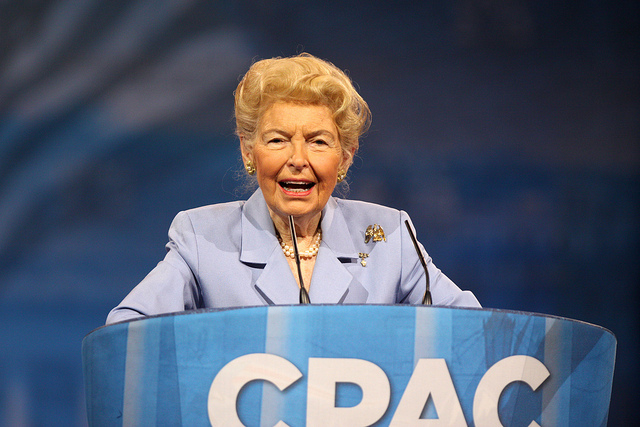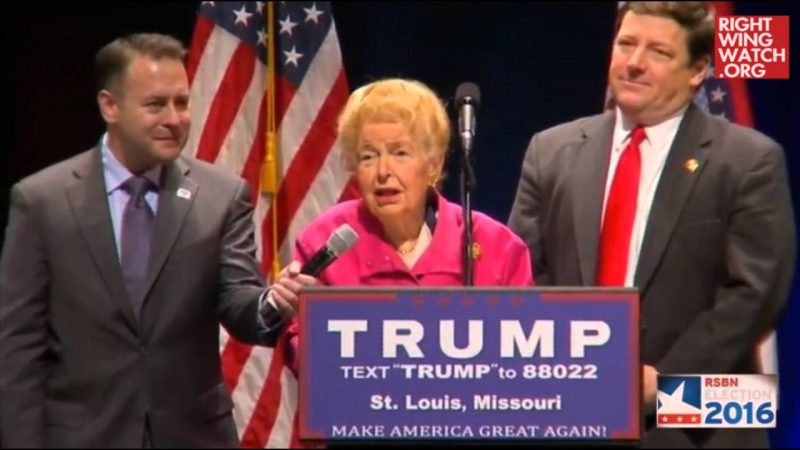The Eagle Forum’s Phyllis Schlafly has reportedly blasted Steve Forbes for apologizing for publishing a widely criticized piece by Michael Noer in his magazine entitled “Don’t Marry Career Women.”
According to Agape Press
Eagle Forum’s Phyllis Schlafly feels Forbes has no reason to apologize since the facts and statistics Noer cited were sound. In fact, she suggests, an article like this should have been written 20 years ago, and this one still hits the right note today because, contrary to the feminist myth, a woman really cannot “have it all” — at least, not all at the same time.
It is more than a little ironic that a woman as successful as Schlafly – who put herself on the map with 1964’s “A Choice Not An Echo,” almost single-handedly killed the Equal Rights Amendment, possesses a Masters degree and a law degree, runs one of the most influential right-wing organizations in Washington, DC, has testified before more than 50 congressional and state legislative committees, has been a delegate to the Republican National Convention nearly ten times, has thrice been elected President of the Illinois Federation of Republican Women, and was twice a candidate for Congress from Illinois – would come out in defense of a piece arguing that men should not marry “career women.”
It is even more ironic that Schalfly has made an entire career out of being an anti-feminist zealot , one who reportedly believes that “the flight from the home is a flight from yourself, from responsibility, from the nature of woman, in pursuit of false hopes and fading illusions” especially considering that her own parents reportedly believed “their daughters should not be any less ambitious or educated than boys.”
Schlafly founded her (eventually) powerful Eagle Forum in 1975 as “the alternative to women’s lib.” She opposed the E.R.A. on the grounds that it would take away the “special protection” the “Christian tradition of chivalry” offered women – in other words, the “right” to be “supported and protected” by men. “Those women lawyers, women legislators, and women executives promoting E.R.A. have plenty of education and talent to get whatever they want in the business, political and academic world,” is how one anti-E.R.A. letter distributed to Ohio state legislators put it. “We, the wives and working women, need you, dear Senators and Representatives, to protect us.”
…
In many ways, Phyllis Schlalfy, née Stewart, would seem an unlikely candidate for a life spent on the antifeminist front lines. She was raised in St. Louis by a working mother who kept her family afloat after her husband lost his job in the Great Depression. She was encouraged to excel academically by both her parents, who, Critchlow writes, believed “their daughters should not be any less ambitious or educated than boys.”
Schlafly received a four-year scholarship to a local Roman Catholic college, but left after a year because it wasn’t sufficiently challenging. Instead, she decided to pay her own way through Washington University by taking on a full-time job firing rifles and machine guns to test ammunition at the St. Louis Ordnance Plant. She worked night shifts – 4 p.m. to midnight or midnight to 8 a.m. – and then attended morning classes. She graduated early, made Phi Beta Kappa and called the ordeal “the most wonderful two years of my life, a beautiful experience.”
Schlafly got a master’s degree from Radcliffe, established herself professionally and achieved economic self-sufficiency, then married a St. Louis man with whom she bonded intellectually. (They took an extra suitcase of books along for the honeymoon.) Comfortably settled in a mansion in Fairmount, Ill., she had six children and rose to national prominence, first as an ardent anti-Communist, then as an antifeminist crusader.
Why would such an independent-minded, ambitious, self-motivated and capable woman devote so much effort to making sure that members of her sex would benefit from their dependence upon men? How could Schlafly reconcile her professed anti-elitism and opposition to day care with the fact that, although presenting herself as a traditional wife and mother, she ran for Congress twice, campaigned hard for Goldwater, crisscrossed the country speaking out for conservative causes, wrote more than a dozen books and enjoyed the services of a housekeeper who stayed with her family for 26 years?
That is a good question. The answer is apparently that Schlafly is so committed to the idea that women should stay at home that she felt compelled to dedicate her entire career to advocating for it.







